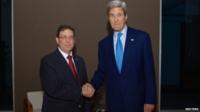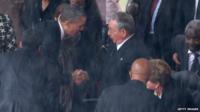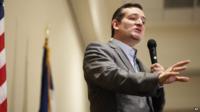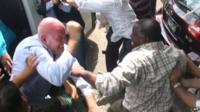
US Secretary of State John Kerry and Cuban Foreign Minister Bruno Rodriguez have held talks, in the highest level meeting between the two countries in more than half a century.
The two held closed-door discussions after arriving in Panama for a summit.
Meanwhile, the US state department has reportedly recommended that Cuba be removed from its list of states said to sponsor terrorism.
Such a move could pave the way for the two countries re-opening embassies.
US President Barack Obama and Cuban leader Raul Castro are also due to meet on the sidelines of the Summit of the Americas in Panama over the coming days.
"Secretary Kerry and Cuban Foreign Minister Rodriguez had a lengthy and very constructive discussion this evening. The two agreed they made progress and that we would continue to work to resolve outstanding issues," a senior US official said.
The last comparable high-level meeting was in 1959, when Fidel Castro met then Vice-President Richard Nixon.
Diplomatic ties froze two years later, but last year Mr Obama announced that a "new chapter" in relations would commence.
At the same time, Mr Obama ordered a review of Cuba's status which he now confirms has finished its work.

Despite the huge political gulf between them, Barack Obama and Raul Castro are on the verge of making history in Panama.
Not since President Eisenhower sat down with Cuban leader Fulgencio Batista has a sitting US president met a Cuban one.
President Obama may also now come bearing gifts. It is expected that he will confirm that Cuba has been removed from the list of state sponsors of terrorism, a sticking point between the two countries which dates back to 1982.
For Mr Obama, this is an important diplomatic step which shows to the Cuban leader he is a man of his word when it comes to a willingness to normalise relations with the communist island.
From Cuba's perspective, being taken off the blacklist is a welcome move and a key priority to moving the relationship forward - though they felt their inclusion was illegitimate in the first place.

Mr Obama refuses to divulge the findings of the latest review, but Senator Ben Cardin - a leading member of the Senate Foreign Affairs Committee - said the state department had recommended removing Cuba from the list of state sponsors of terrorism.
The move was "the result of a months-long technical review" and would be "an important step forward in our efforts to forge a more fruitful relationship with Cuba", he said.


Cuba is one of four countries still on the US list of countries accused of repeatedly supporting global terrorism; Iran, Sudan and Syria are others.
It was first put on the list in 1982 for offering sanctuary to militant ETA Basque separatists and Colombian Farc rebels.
Removing Cuba from the list could lead to the easing of financial restrictions on Cuba's access to loans and aid.
If Mr Obama opts to accept the state department's recommendations, Congress would have 45 days to decide whether to override him.
He faces fierce critics of his Cuban policy at home, such as from Cuban-American Ted Cruz, who is a Republican presidential candidate.
Mr Obama has defended his approach, saying: "We don't want to be imprisoned by the past. When something doesn't work for 50 years, you don't just keep on doing it. You try something new."

Correspondents say removing Cuba from the list of state sponsors of terrorism will throw a stark light on the US's relations with Venezuela.
The Venezuelan President Nicolas Maduro hopes to bring a petition signed by 10 million of his citizens urging Mr Obama to remove an order imposing sanctions against seven Venezuelan officials accused of human rights abuses in an opposition crackdown.
Oil-rich Venezuela has many friends at the summit and other Latin American nations have criticised the order, which calls Caracas a US national security threat.
President Obama has tried to reduce tensions with Venezuela ahead of the summit, saying the US did not perceive the country as a threat.
"But we do remain very troubled by the Venezuelan government's efforts to escalate intimidation of its political opponents," he told the Spanish news agency Efe.

Key moments in US-Cuban relations since Cuba's 1959 revolution

1960: US breaks off diplomatic relations and imposes trade embargo
1961: US backs failed Bay of Pigs invasion; Fidel Castro proclaims Cuba a communist state and begins to ally with USSR
1962: Fearing US invasion, Castro allows USSR to deploy nuclear missiles in Cuba. Crisis takes the two superpowers to brink of nuclear war
1980: Around 125,000 Cubans, many of them released convicts, flee to the US when Castro temporarily lifts restrictions
1993: US tightens embargo, which introduces some market reforms amid economic woe following collapse of the Soviet Union
1999: Cuban child Elian Gonzalez picked up in refugee boat off Florida coast and placed with relatives in Florida, against wishes of father in Cuba. After numerous court decisions, US federal agents seize him to return to father
2002: US Under-Secretary of State John Bolton adds Cuba to "axis of evil"
2014: President Obama announces moves to normalise diplomatic and economic ties in a "new chapter" of US-Cuba relations

Anda sedang membaca artikel tentang
US and Cuba hold historic meeting
Dengan url
http://worldartikelku.blogspot.com/2015/04/us-and-cuba-hold-historic-meeting.html
Anda boleh menyebar luaskannya atau mengcopy paste-nya
US and Cuba hold historic meeting
namun jangan lupa untuk meletakkan link
US and Cuba hold historic meeting
sebagai sumbernya
0 komentar:
Posting Komentar